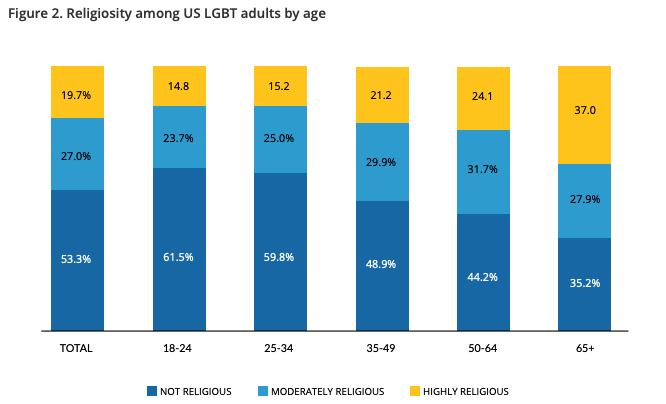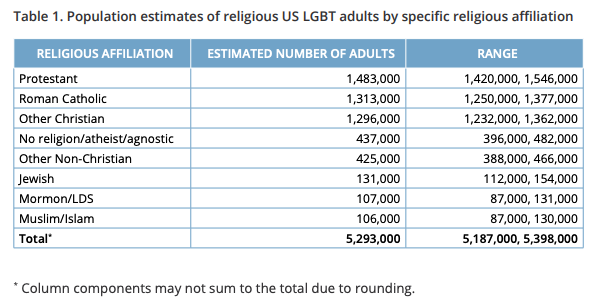Faith is vital to millions of LGBTQ Americans whose patterns of belief and practice closely mirror those of the wider U.S. population, according to a new study.
“Religious LGBT adults, including those who are moderately or highly religious, are socio-demographically diverse, reside in every region and state, and are represented across all religious denominations. Among LGBT adults, older adults, Black adults, and those residing in the South are the most likely to be religious,” the Williams Institute at UCLA’s School of Law reported in its study, “Religiosity Among LGBT Adults.”
 Authors of the report said a deeper examination of LGBTQ people and religion had been long overdue: “Religion in the United States has been studied widely; however, relatively little is known about religiosity and LGBT people. Prior population-based studies indicate that more than half of LGBT adults are religiously affiliated, yet information about the importance of religion to LGBT people, their service attendance and characteristics has been lacking.”
Authors of the report said a deeper examination of LGBTQ people and religion had been long overdue: “Religion in the United States has been studied widely; however, relatively little is known about religiosity and LGBT people. Prior population-based studies indicate that more than half of LGBT adults are religiously affiliated, yet information about the importance of religion to LGBT people, their service attendance and characteristics has been lacking.”
The Williams Institute analyzed Gallup and U.S. Census data to discern levels of religious devotion and observance among LGBTQ Americans and to estimate their share of the population and sociodemographic attributes.
Respondents initially were asked if they identify as lesbian, gay, bisexual or transgender. Those who answered affirmatively were asked two faith-related questions: “Is religion important to your daily life?” and “How often do you attend church, synagogue or mosque?”
Those classified “not religious” said faith is unimportant to their daily lives and they seldomly or never attend services. “Moderately religious” respondents described faith as essential while attending services once a month monthly or less. “Highly religious” LGBTQ adults claimed religion as important while attending services on a weekly or almost weekly basis.
 Of the estimated 13.9 million LGBTQ adults nationwide, about 5.3 million identify as religious, including more than 3 million moderately religious and 2.2 million highly religious adults. Percentagewise, 53.3% are not religious compared to 46.7% who profess faith, including 27% who are moderately religious and19.7% who are highly religious.
Of the estimated 13.9 million LGBTQ adults nationwide, about 5.3 million identify as religious, including more than 3 million moderately religious and 2.2 million highly religious adults. Percentagewise, 53.3% are not religious compared to 46.7% who profess faith, including 27% who are moderately religious and19.7% who are highly religious.
The Williams Institute’s count of American adults who identify within the LGBTQ community is lower than some other estimates than range as high as 20 million.
Other studies have consistently documented declining religious adherence across all segments of U.S. society, with younger generations leading the way. The Williams Institute reported those trends holding true in its study of the LGBTQ community as well.
“Demographic patterns in religiosity observed in the general population are also observed among LGBT adults,” the report says. “Middle-aged and older adults are more likely to be religious than younger adults. … Moderately and highly religious adults are older than those who are not religious and are more likely to be people of color than those who are not religious.”
About 40% of respondents ages 18 to 34 identify as religious, as do 51.1% of those 35 to 49, 55.8% of those 50 to 64 and 64.9% of those 65 and older. More than 60% of 18- to 24-year-olds identify as non-religious, compared to only 35% of LGBTQ Americans age 65 and up, the study found.
“Among LGBT adults, the majority (71%) of Black adults are religious — either moderately (39.3%) or highly (31.7%) religious. More than half of LGBT Hawaiian/Asian Pacific Islander (61%), American Indian/Alaskan Native (57.2%), as well as Latino/a (57.3%) adults are moderately or highly religious. More than half of adults who are white (62.5%), Asian (60.1%), and those who report more than one race (55.1%), are not religious.”
Reflecting the national breakdown, the largest concentration of religious LGBTQ adults is in the South, with 54% who say they are religious. Of those, nearly 1.2 million are moderately religious and 904,000 highly religious.
“The West is home to the second largest population of moderately (701,000) and highly religious (455,000) LGBT adults. In the Northeast, there are 521,000 moderately religious and 372,000, highly religions adults, while in the Midwest there are 546,000 and 444,000 moderately and highly religious adults.”
Within the segment of the LGBTQ community that identifies as religious, 77% are Christian, 8% are either agnostic or atheist or “other non-Christian,” 2.5% are Jewish and 2% each are Mormon or Muslim.
Among the Christians, 1.4 million (28%) are Protestant, 1.3 million (24.8%) Roman Catholic and 1.2 million (24.5%) are “other Christian,” the report says.
More than 420,000 are affiliated with other non-Christian religions, more than 130,000 are Jewish, more than 100,000 are affiliated with Islam, and 100,000 are affiliated with the Church of Jesus Christ of Latter-Day Saints.
Related articles:
The cause of a scene: Why gay Christians are afraid to come out to their pastors | Opinion by Mallory Challis
My quest to find the word ‘homosexual’ in the Bible | Opinion by Ed Oxford
Repressing my sexual orientation cost me my health — permanently | Opinion by Amber Cantorna
Couple helps parents of LGBTQ kids come out of the closet
Meet Sally Gary, the Churches of Christ advocate for gay Christians




